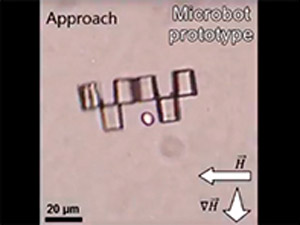



Date:15/07/17
 From wire to finished product in less than 13 minutes: a new robot-builder is faster than most takeaways. It works by bending wire that already has motors attached into different shapes, using a process its designers call 1D printing. Once the robot has performed its job, it can simply be flattened and fed back into the system to be recycled into a new type of robot.
From wire to finished product in less than 13 minutes: a new robot-builder is faster than most takeaways. It works by bending wire that already has motors attached into different shapes, using a process its designers call 1D printing. Once the robot has performed its job, it can simply be flattened and fed back into the system to be recycled into a new type of robot.
“The idea is that you analyse the current situation, then make a robot on the fly that can deal with it,” says Sebastian Risi at the IT University of Copenhagen in Denmark, a member of the team that came up with the system. If you need a robot that can fit through a small space or around an odd-shaped corner, you input those constraints into the software and it will deliver something suitable.
The system uses evolutionary algorithms that improve their designs bit by bit until they reach one that satisfies all the constraints. This means that the system doesn’t have to come up with the best design on its first attempt, but can keep evolving the design until it works.
“You then end up with a robot that can crawl under that awkward piece of rubble or over collapsed wall in a burning building. They are cheap and easy to make, and afterwards you can easily recycle them or just make a new one,” he says.
The idea could be useful for space missions, Risi thinks, as they can’t accommodate 15 different robots to do different things, so being able to create and recycle them quickly would be handy.
“It’s really cool that the system takes into account the whole process from design to fabrication,” says Cynthia Sung at University of Pennsylvania. This means that anyone could create their own bespoke printed robots with no prior knowledge required.
Risi and his colleagues now want to augment the robots with sensors, like cameras or microphones.
Transformer robots can be printed on demand in just 13 minutes
 From wire to finished product in less than 13 minutes: a new robot-builder is faster than most takeaways. It works by bending wire that already has motors attached into different shapes, using a process its designers call 1D printing. Once the robot has performed its job, it can simply be flattened and fed back into the system to be recycled into a new type of robot.
From wire to finished product in less than 13 minutes: a new robot-builder is faster than most takeaways. It works by bending wire that already has motors attached into different shapes, using a process its designers call 1D printing. Once the robot has performed its job, it can simply be flattened and fed back into the system to be recycled into a new type of robot.“The idea is that you analyse the current situation, then make a robot on the fly that can deal with it,” says Sebastian Risi at the IT University of Copenhagen in Denmark, a member of the team that came up with the system. If you need a robot that can fit through a small space or around an odd-shaped corner, you input those constraints into the software and it will deliver something suitable.
The system uses evolutionary algorithms that improve their designs bit by bit until they reach one that satisfies all the constraints. This means that the system doesn’t have to come up with the best design on its first attempt, but can keep evolving the design until it works.
“You then end up with a robot that can crawl under that awkward piece of rubble or over collapsed wall in a burning building. They are cheap and easy to make, and afterwards you can easily recycle them or just make a new one,” he says.
The idea could be useful for space missions, Risi thinks, as they can’t accommodate 15 different robots to do different things, so being able to create and recycle them quickly would be handy.
“It’s really cool that the system takes into account the whole process from design to fabrication,” says Cynthia Sung at University of Pennsylvania. This means that anyone could create their own bespoke printed robots with no prior knowledge required.
Risi and his colleagues now want to augment the robots with sensors, like cameras or microphones.
Views: 384
©ictnews.az. All rights reserved.Similar news
- Justin Timberlake takes stake in Facebook rival MySpace
- Wills and Kate to promote UK tech sector at Hollywood debate
- 35% of American Adults Own a Smartphone
- How does Azerbaijan use plastic cards?
- Imperial College London given £5.9m grant to research smart cities
- Search and Email Still the Most Popular Online Activities
- Nokia to ship Windows Phone in time for holiday sales
- Internet 'may be changing brains'
- Would-be iPhone buyers still face weeks-long waits
- Under pressure, China company scraps Steve Jobs doll
- Jobs was told anti-poaching idea "likely illegal"
- Angelic "Steve Jobs" loves Android in Taiwan TV ad
- Kinect for Windows gesture sensor launched by Microsoft
- Kindle-wielding Amazon dips toes into physical world
- Video game sales fall ahead of PlayStation Vita launch





















